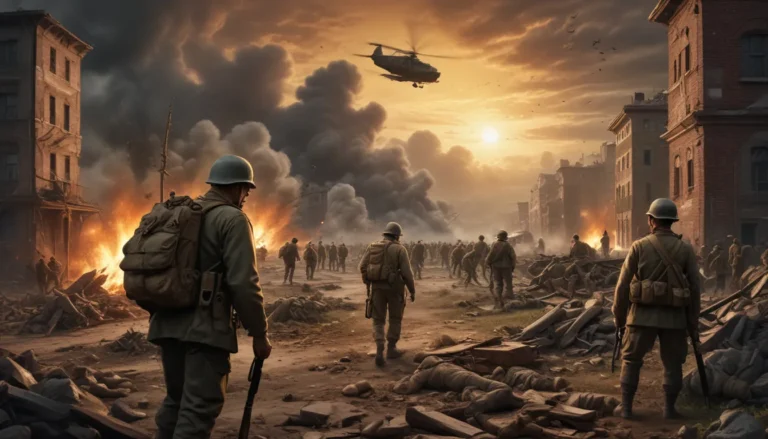The images in our articles may not match the content exactly. They are used to grab your attention, not to show the exact details in the text. The images complement the text but do not replace it.
History is often seen through rose-colored glasses, focusing on tales of heroism and progress. However, behind the curtains of polished narratives lie a host of dark and dirty secrets that have left a lasting impact on our world. In this article, we will take a deep dive into 20 unsettling historical facts that shed light on the less savory aspects of our shared past. From scandalous affairs to brutal atrocities, get ready to explore the hidden underbelly of history.
The Borgia Dynasty: A Family of Depravity
The Borgia family, known for their corrupt influence during the Renaissance, engaged in various immoral acts that tainted their legacy. Pope Alexander VI, a prominent Borgia patriarch, was rumored to have indulged in orgies within the walls of the Vatican and sired numerous illegitimate children. This scandalous behavior not only tarnished the reputation of the Catholic Church but also raised questions about the moral integrity of those in positions of power.
The Salem Witch Trials: Mass Hysteria and Injustice
The Salem Witch Trials of the late 17th century stand as a harrowing example of mass hysteria and injustice. In the small town of Salem, Massachusetts, a frenzy of accusations and trials related to witchcraft led to the executions of 20 individuals, primarily women. Based on flimsy evidence and fueled by superstition, these trials underscore the dangers of unchecked fear and the abuse of authority.
Queen Victoria and John Brown: A Scandalous Affair
Queen Victoria, a prominent figure in British history, shocked society with her unconventional relationship with her servant, John Brown, following the death of her husband, Prince Albert. This secret love affair stirred controversy in the royal court and among the public, challenging traditional norms and shedding light on the complexities of personal relationships in the public eye.
The Opium Wars: Britain’s Dark Trade
The 19th-century Opium Wars between Britain and China revealed the dark underbelly of colonialism and exploitation. The British East India Company flooded the Chinese market with opium, fueling addiction and social devastation. These wars, fought to protect Britain’s opium trade, serve as a stark reminder of the human cost of unchecked greed and imperial ambition.
The Tuskegee Syphilis Study: Unethical Medical Experimentation
The Tuskegee Syphilis Study in Tuskegee, Alabama, from 1932 to 1972, exemplifies a dark chapter in American medical history. African American men were withheld proper treatment for syphilis to observe the disease’s progression, causing immense harm to the participants and their families. This unethical experiment highlights the grave consequences of disregarding ethical standards in medical research.
The Reign of Terror: Bloodshed in the French Revolution
The French Revolution’s Reign of Terror, spearheaded by Maximilien Robespierre and the Committee of Public Safety, resulted in the execution of thousands of individuals, including King Louis XVI and Queen Marie Antoinette. This wave of violence stained revolutionary ideals with blood, showcasing how noble intentions can spiral into brutality and chaos.
Japanese Unit 731: Horrific Human Experimentation
During World War II, the Japanese Imperial Army’s Unit 731 conducted gruesome biological and chemical experiments on prisoners of war, including vivisection and intentional infection. The inhumane practices at this covert facility inflicted unimaginable suffering and death, highlighting the depths of human depravity during wartime.
The Spanish Inquisition: Religious Persecution and Torture
The Spanish Inquisition, established in the late 15th century, employed brutal methods of interrogation, including torture, to root out heresy and maintain Catholic orthodoxy. This dark chapter in history is synonymous with religious persecution and abuse of power, showcasing the lengths to which institutions would go to maintain control.
The Rwandan Genocide: Ethnic Cleansing Unleashed
The Rwandan Genocide of 1994 stands as a stark reminder of the consequences of ethnic hatred and intolerance. Over 800,000 Tutsis were massacred in just 100 days, highlighting the devastating impact of hate and the failure of international intervention in preventing such atrocities.
The Atlantic Slave Trade: Legacy of Human Trafficking and Brutality
The transatlantic slave trade, spanning over four centuries, forcibly transported millions of Africans to the Americas under deplorable conditions. This abhorrent trade not only shaped racial dynamics but also left a lasting scar on history, illustrating the cruelty and inhumanity that underpinned the colonial enterprise.
The Roman Gladiator Games: Spectacle of Bloodsport
The ancient Roman gladiator games captivated audiences with violent displays of combat, often resulting in the death of participants. Slaves and prisoners were forced to fight to entertain the masses, shedding light on the brutal nature of entertainment in ancient times and the disregard for human life in pursuit of spectacle.
The Holodomor: Stalin’s Man-Made Famine
Under Joseph Stalin’s rule, the Soviet-engineered Holodomor famine in Ukraine in the early 1930s led to the deaths of millions due to forced collectivization and grain confiscation. This man-made tragedy stands as one of history’s most devastating acts of genocide by starvation, highlighting the catastrophic consequences of political extremism.
The Salem Poor: Overlooked Heroism of Bunker Hill
Salem Poor, an African American soldier, displayed remarkable bravery during the Battle of Bunker Hill in 1775, yet faced racial prejudice and was denied recognition for his valor. His story serves as a reminder of the injustices faced by marginalized communities throughout history and the importance of acknowledging their contributions to shaping the world.
The Nanking Massacre: Unleashing Horrors of War
The Nanking Massacre during the Second Sino-Japanese War witnessed unspeakable atrocities committed by the Imperial Japanese Army against Chinese civilians and prisoners of war. The rape, murder, and brutalization of innocents in Nanking left a deep scar on Sino-Japanese relations and revealed the depths of human depravity in wartime.
The Dust Bowl: Environmental Catastrophe
The Dust Bowl of the 1930s, caused by a severe drought and unsustainable farming practices, engulfed the Great Plains in massive dust storms, leading to environmental devastation and economic hardship for countless families. This man-made disaster serves as a cautionary tale of the consequences of ecological ignorance and exploitation.
The Trail of Tears: Tragic Forced Migration of Native Americans
The Trail of Tears, resulting from the Indian Removal Act of 1830, forcibly displaced Native American tribes, such as the Cherokee, from their ancestral lands in the southeastern United States. The arduous journey led to the deaths of thousands through exposure, disease, and violence, highlighting the tragic impact of governmental policies on indigenous communities.
The Malleus Maleficarum: Fueling Witch Hunts
The Malleus Maleficarum, a treatise on identifying and prosecuting witches, facilitated the European witch-hunting hysteria of the 15th to 17th centuries. This influential book perpetuated the persecution of countless innocent individuals, predominantly women, under the guise of eradicating witchcraft, revealing the catastrophic consequences of unchecked superstition and fear.
The Gulags: Soviet System of Forced Labor
Stalin’s Gulags, a network of forced labor camps in the Soviet Union, served as a tool of repression and punishment for political dissidents and ordinary citizens. The harsh conditions, torture, and rampant abuse within these camps exemplified the brutality of Stalinist rule, showcasing the lengths to which authoritarian regimes would go to silence dissent.
The Killing Fields of Cambodia: Tragedy of the Khmer Rouge Regime
From 1975 to 1979, Cambodia was under the brutal rule of the Khmer Rouge regime led by Pol Pot, resulting in the deaths of an estimated two million people through executions, forced labor, and starvation. The legacy of the Killing Fields echoes a harrowing period in Cambodian history marked by systemic violence and mass atrocities.
The Comfort Women: Forgotten Victims of Sexual Slavery
The Imperial Japanese Army’s system of sexual slavery, euphemistically termed “comfort women,” subjected tens of thousands of women from occupied territories to rape, sexual abuse, and inhumane conditions during World War II. The plight of these women speaks to the enduring legacy of wartime sexual violence and exploitation.
Confronting Uncomfortable Truths
As we confront these unsettling aspects of history, we are faced with the stark realization that the past is not always a tale of progress and enlightenment. By examining these dark moments with a critical eye, we can glean valuable lessons and strive to build a more just and humane future.
Exploring the Impact of Dark History
Why is it crucial to study the dark aspects of history?
Exploring the dark aspects of history enables us to understand the complexities of human behavior, the consequences of unchecked power, and the potential for both good and evil in society. By confronting these uncomfortable truths, we can learn from the mistakes of the past and cultivate a more informed and empathetic understanding of our shared history.
What repercussions did perpetrators face for their actions in these historical events?
The consequences for those responsible for dark historical events varied, ranging from legal proceedings, such as the Nuremberg Trials, to instances where accountability was lacking. Acknowledging these events is crucial in fostering accountability, preventing future atrocities, and ensuring justice for victims and survivors.
How does the study of dark history influence contemporary society?
Studying dark history prompts us to recognize the dangers of discrimination, abuse of power, and systemic injustices that persist in society. By understanding the root causes and consequences of past atrocities, we can work towards creating a more equitable and compassionate world, where the mistakes of history are not repeated.
What initiatives exist to address the legacies of these troubling historical events?
Efforts to address the legacies of dark historical events include memorialization through museums, educational programs, and truth and reconciliation commissions in some countries. These initiatives seek to promote healing, justice, and dialogue surrounding past atrocities, fostering understanding and empathy in the face of historical trauma.
How can individuals contribute to preventing similar atrocities in the future?
Individuals can play a crucial role in preventing future atrocities by educating themselves and others about history, advocating for human rights, challenging prejudice and discrimination, and promoting inclusivity and tolerance. By actively engaging with the past and present, we can work towards a more just and peaceful society for all.
Reflecting on Our Shared History
Our commitment to delivering compelling and reliable content remains the cornerstone of our mission. Each historical fact on our site is a testament to the diverse insights and knowledge contributed by real users like you. Our dedicated editors meticulously review each submission to ensure accuracy and authenticity, guaranteeing that the information we provide is not only engaging but also trustworthy. Join us as we continue to explore the complexities of history and uncover the valuable lessons embedded in its darkest chapters.






